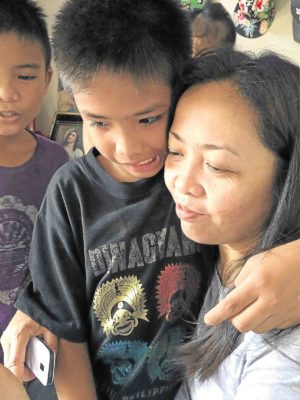
Ten-year-old Angel and Mary Joy look at a photo of Rumar sent to a phone by Rear Admiral Rene Medina —JULIE S. ALIPALA
ZAMBOANGA CITY — It was a rescue operation led by a woman who refused to give up hope of seeing her husband, trapped in Marawi City, alive again.
For more than two months, Mary Joy Marjalino, 32, held on to her mobile phone like her life and that of her husband, Rumar, 38, depended on it.
Rumar, his brother Rowell and friend Jimmy Esperat found work in Marawi as carpenters.
When fighting broke out between government troops and terrorists out to turn Marawi into an Islamic State (IS) province, Rumar and company heeded an advice given by their employer to just stay put as it was safer.
Fleeing Marawi was riskier, they were told, because members of Maute, a homegrown terror group that swore fealty to IS, could either capture or shoot them.
Mary Joy and Rumar kept in touch through their mobile phones with Rumar finding refuge in a place that had electricity to keep his phone battery alive.
Mary Joy gave Rumar encouragement, prayed and, not knowing where to turn to, sought help from the Inquirer to connect her with military officials involved in the Marawi operations.
Soldiers’ help
She held on to hope amid reports that the war in Marawi was turning from bad to worse.
“I always prayed and believed that my husband would eventually come home alive,” Mary Joy said.
The coordination between Mary Joy and the military proved to be key to Rumar and his companions’ survival.
Her husband would constantly give her updates about his situation through text messages or calls. Mary Joy would pass the information on to the Inquirer for relay to security officials.
At dawn of July 4, Mary Joy’s prayer was answered. Rumar called her up to say he and his companions made it out of the war zone.
“We are now in safe hands. The Navy saved us,” Rumar said, according to Mary Joy. Rumar’s brother, Rowell, was safe, too.
Mary Joy announced the good news to her son, 10-year-old Angel, and her mother-in-law, Rita. “We all cried and laughed,” she said.
Rita gave credit to Mary Joy for the survival of Rumar and Rowell.
Mary Joy, according to Rita, “really moved heaven and earth to save her husband and Rowell.” “She called everyone, knocked on every office,” Rita said.
Mary Joy’s efforts did not save only her husband and brother-in-law. They also meant survival for Jimmy, 42, colleague of Rumar, and another yet unidentified man from Iligan City.
Like Mary Joy, Aleta, 40, Jimmy’s wife, didn’t stop praying.
Phones in rubble
“He looked older and tired, he lost his dentures,” she said when shown a photo of Jimmy.
Keeping in touch for Rumar meant scavenging for discarded phones in the war rubble and repairing these.
On July 3, Mary Joy alerted the military about Rumar and his companions’ plan to get out of Marawi.
They would move out in darkness but feared being mistaken by the military for terrorists. Mary Joy coordinated this with soldiers.
“There were codes and signals established,” Mary Joy said.
She said she made sure Rumar understood everything before his group jumped into Lake Lanao in the evening of July 3 because “one mistake and the four of them could end up dead, mistaken for IS fighters.”
At midnight of July 3, Rumar sent a text message to say he and his companions were proceeding to the lake. Mary Joy immediately alerted the Navy.
After a tense three hours, Rumar called up Mary Joy to say he and his three companions were already safe.
Rear Admiral Rene Medina, commander of Naval Forces in Western Mindanao, said the men would be turned over to their families after a debriefing session.
But Mary Joy and Aleta also wished for one thing to keep their husbands home — jobs. —Julie S. Alipala